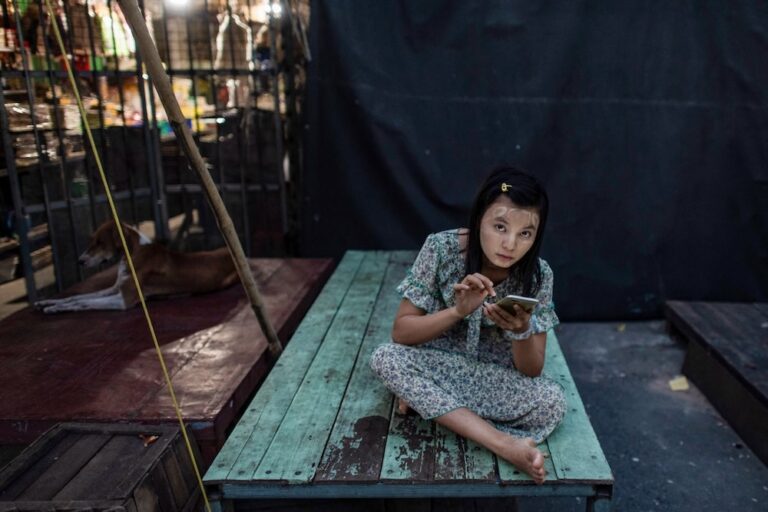(Mizzima/IFEX) – The following is a 12 March 2008 Mizzima News press release: Cyber-dissidents draw international recognition for risking lives Even as Burma’s military rulers maintain tight censorship of the Internet, Burmese activists in Rangoon and elsewhere continue to risk their lives using the Internet to export information. A Burmese activist who operates a blog […]
(Mizzima/IFEX) – The following is a 12 March 2008 Mizzima News press release:
Cyber-dissidents draw international recognition for risking lives
Even as Burma’s military rulers maintain tight censorship of the Internet, Burmese activists in Rangoon and elsewhere continue to risk their lives using the Internet to export information.
A Burmese activist who operates a blog says it is a cat-and-mouse game between bloggers and the junta, who constantly keeps a close watch over their activities on the Internet.
“There is never a time that we are safe while using the Internet. It is a risky game we are playing,” said the blogger, who has consistently fed Mizzima with information from inside Burma.
While a slow Internet connection is a major hurdle, Burmese cyber-dissidents are playing a daring game by using proxy servers or certain software to bypass the government’s stiff firewalls designed to block all dissident and political websites, including international news websites, the blogger said.
“Since the Internet connection is so slow it is almost impossible to surf at home. So, we use cybercafes, which are not safe, and we never know when we will be questioned or taken for interrogation,” he elaborated, wishing not to be named for security reasons.
“It is never predictable what will happen to us when we are chatting on Gtalk with someone outside the country because we never know who is watching or monitoring us,” he added.
At the end of January 2008, police in Burma’s former capital of Rangoon arrested a prominent Burmese blogger, Nay Phone Latt, for running a blog that expressed his youthful feelings and aspirations. He also owns three Internet cafes in Rangoon.
While charges were made against him under the Video and Electronic Act, it is obvious that the junta had targeted him for his role in promoting the free flow of information via the Internet. He had earlier been arrested under the Emergency Provision Act and had faced a possible seven-year jail term.
As a sign of solidarity with the struggles of cyber-dissidents in Burma as well as others across the world, a Paris-based media watchdog has designated 12 March as the inaugural Online Free Expression Day, dedicated to combating Internet censorship and fighting for freedom of online expression.
Reporters Without Borders (RSF) is encouraging everyone to visit its website to select a message and a banner directed at opposing cyber-policing in any one of nine countries. The countries in question are Burma, China, Cuba, Egypt, Eritrea, North Korea, Tunisia, Turkmenistan and Vietnam.
“A response of this kind is needed to the growing tendency to crack down on bloggers and to close websites,” submits RSF.
According to RSF, over 60 persons are presently incarcerated worldwide as a result of their activities as cyber-dissidents. Additionally, the Paris-based organization tallied 2,600 websites, blogs and forums that experienced government-imposed obstacles to access in 2007.
At the height of the September 2007 Saffron Revolution, the Burmese junta took the almost unprecedented action of completely shutting down Internet service in the country.
RSF believes that the incentive for Burma’s generals in keeping a tight grip on Internet use is two-fold – to protect the government’s monopoly of telecommunications and to hunt out opposition activists.
“It keeps a very close eye on Internet cafes, in which computers automatically execute screen captures every five minutes,” an RSF press release said of the junta’s monitoring activities.
In conjunction with Online Free Expression Day, RSF will be offering a new booklet providing advice and skills in establishing anonymous blogs to circumvent censorship. The booklet is also said to contain firsthand experiences of bloggers from Burma.
In all, there are 15 governments in this year’s RSF list of countries hostile to freedom of online expression – Belarus, Burma, China, Cuba, Egypt, Ethiopia, Iran, North Korea, Saudi Arabia, Syria, Tunisia, Turkmenistan, Uzbekistan, Vietnam and Zimbabwe.
In 2007, nearly 40,000 people took part in an RSF online campaign to highlight the lack of Internet freedom in certain parts of the world. The result was a digitally generated map of the world depicting a wide swath of black space, denoting restricted Internet access/activity from North Africa through the Middle East and into East Asia.


